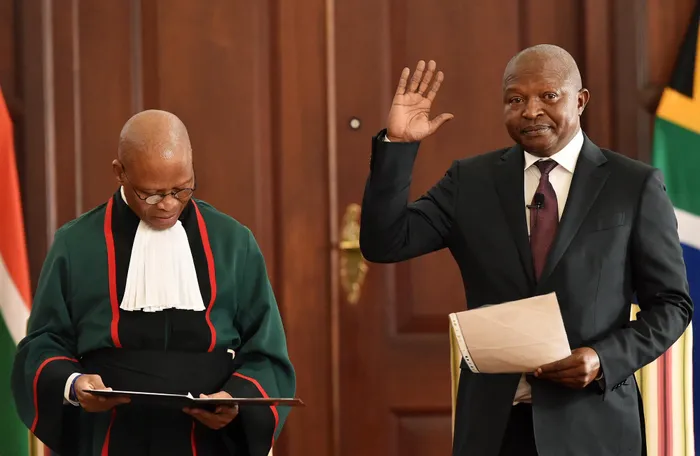Is Deputy President DD Mabuza missing in action?

Deputy President David Mabuza has this afternoon, 28 May 2019, been sworn in by Chief Justice Mogoeng Mogoeng as a Member of Parliament of the Republic of South Africa. Pretoria. 28/05/2019. Jairus Mmutle/GCIS
By Professor Dikeni Majuqwana
According to the Constitution of the Republic of South Africa:
- a) The President appoints the Deputy President and Ministers, assigns their powers and functions, and may dismiss them.
- b) The Deputy President must assist the President in the execution of the functions of government.
- The Deputy President and Ministers are responsible for the powers and functions of the executive assigned to them by the President.
At the same time, the President is head of both the state and the executive.
In other words, the President is politically omnipotent.
How does one become a President?
The President is elected by parliament and therefore directly represents the political “will of the people” as head of state. As head of government, the President represents the translation of the “will of the people” into a national strategy to realise shared aspirations as reflected in our electoral democratic process.
Since the President is politically omnipotent, the outcomes or performance of the executive reflects powerfully on the outlook of the President. Presently, South Africa's national strategy is the National Development Plan (2014-2030) was launched by former President Jacob Zuma.
The NDP is something akin to a long-range plan whose execution is administered by a Minister in the Presidency. It informs how the President, as head of cabinet, allocates responsibilities and judges the performance by his Deputy and cabinet ministers.
It will serve us well to recall that during part of his term of office, former President Jacob Zuma appointed the current President Cyril Ramaphosa as his Deputy.

Zuma allocated Ramaphosa several crucial public responsibilities including overseeing the resolution of performance problems in state-owned companies such as Eskom. Nevertheless, when Zuma’s term ended, and as Ramaphosa assumed his role as President, he felt it proper to label Zuma's term “nine wasted years” even though he formed part of it and stood to inherit an important milestone in the NDP as his own national strategy.
In other words, the relationship between a President and his deputy is fraught with difficulties.
What then is the situation regarding the relationship between Ramaphosa and Mabuza? Is Mabuza missing in action or is he being deliberately denied responsibility to show him up as useless?

Ramaphosa assumed office some four years ago to replace Zuma in a political coup orchestrated by his ANC faction after its conference in December 2017 where DD Mabuza became his ANC Deputy.
In 2019, Ramaphosa and DD Mabuza jointly led the ANC to win the national elections. As far as the role played by DD Mabuza as Deputy President is concerned, I am led to believe it has less to do with a choice made by Ramaphosa as President but more to do with ANC factional political outcomes.
Five years on, the legacy of the Nasrec 2017 is still weighing heavily on the choices that Ramaphosa is able to make in shaping his government. Presently Ramaphosa is fighting tooth and nail to win another term at the coming ANC national elective conference due in December 2022.
With Mabuza, a well-known avid reader of Sun Tzu’s Art of War, it is likely that his apparent inactivity and invisibility may hide a lot of behind-the-scenes activity. Mabuza was recently reported pledging loyalty to President Ramaphosa whose term has been overwhelmed by one crisis after another, some natural and others self-imposed.
For example, the latest reports that Ramaphosa may be involved in illegally keeping millions of US dollars in his Phala-Phala farm is music to the ears of his enemies. Mabuza knows that a man in such dire straits will most likely cling to any hope of survival. At the same time if Ramaphosa is deposed as a result of his many shenanigans, some known and others still to be exposed, Mabuza stands a chance to inherit the Presidency, to win the war without fighting.
My point is that to Ramaphosa, Mabuza represents both the visible and invisible enemy within the ANC, more so than many of those who hope to defeat him in December.
In denying Mabuza any visible role in his Presidency, Ramaphosa may be hoping to show him up as a useless idling soul. This is hardly a smart way to handle an adversary like Mabuza who can always cite the constitution to the effect that he can only perform functions allocated to him by the President.
Take, for example, the role of Minister in the Presidency now under Mondli Gungubele. This is arguably the most powerful role in cabinet today, second only to the President since it now incorporates the Minister of Intelligence. Crucially, what underlines the important role Gungubele plays are events such as the July 2021 Unrest in KZN and the National Assembly going up in flames early this year.
Rising levels of violent crime, economic collapse, run-away illegal immigration, widespread corruption and serial pandemic disease outbreaks suggest a deteriorating situation. Against this background, one would have expected the President to shoulder the responsibility jointly with his Deputy, a far cry from what we can glean from a distance.
Dikeni Majuqwana is Head of Engineering at the University of Zululand. He writes in his personal capacity.
This article is original to The African. To republish, see terms and conditions.